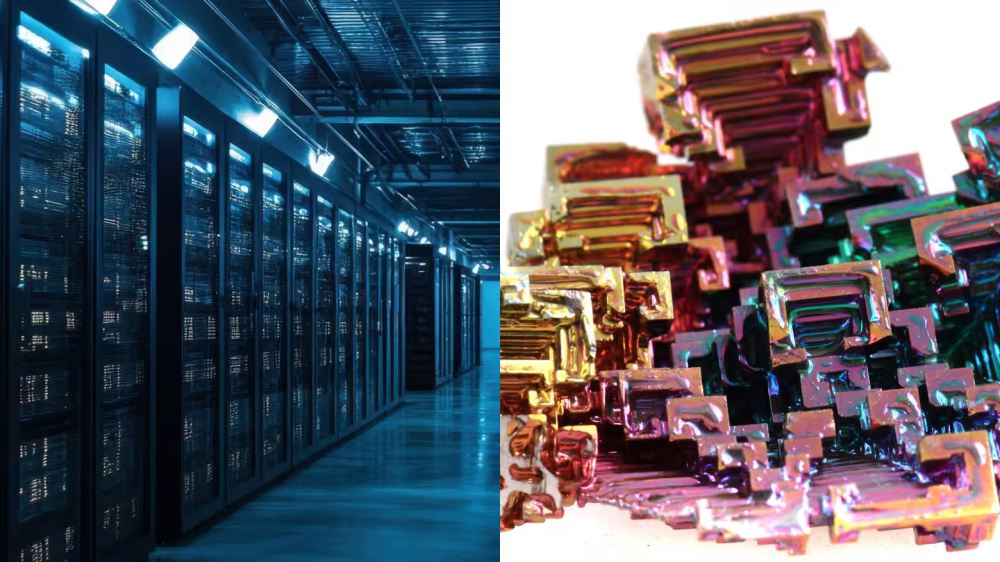TAIPEI -- Tech companies building AI data centers for Nvidia, Amazon and Google are counting on a breakthrough in U.S.-China trade negotiations as their stockpiles of critical minerals and related materials run painfully low.
China tightened its restrictions on critical elements used in tech manufacturing in April amid trade tensions with the U.S. Since then, prices of these elements have surged, and supplies of materials that use them, such as low-temperature solder paste, can be measured in weeks, executives from multiple suppliers told Nikkei Asia.
Low-temperature solder paste is essential for mounting components onto printed circuit boards and thermal modules and for other key manufacturing steps, sources said. It requires an alloy of tin and bismuth, the latter of which is subject to Chinese export restrictions.
"Our inventory of low-temperature solder paste, critical for building AI servers and thermal management solutions, is now running low," an executive at a supplier to Nvidia, Amazon and Google told Nikkei Asia.
"While China isn't fully blocking exports, the prolonged review processes are already disrupting the supply chain," the executive said. "We have stockpiled some inventory in the region, but it will only last about 1.5 months. We are now counting on presidents [Donald] Trump and Xi [Jinping] to have favorable talks and reach an agreement."
Top trade representatives from the two countries met in London this week to discuss the trade situation and announced on Tuesday that they had reached a "framework" agreement involving critical minerals and chips. Few details were given, however.
Another executive with the above Nvidia, Amazon and Google supplier said his company has been counting on talks between the U.S. and China turning things around. "These kinds of things can be solved with just a few words by politicians," the executive said.
An executive with a thermal solutions supplier to Nvidia and AWS said his company has been looking for non-bismuth solder paste alternatives since April, but was surprised to find these were even pricier.
"We didn't stockpile solder paste before April, so we've been paying several times more to buy it in recent months," the executive told Nikkei Asia. "And guess what? The non-bismuth solutions are even more expensive!"
Bismuth is an increasingly popular choice for electronics and other applications. It has a low toxicity, and its low melting point means it consumes less energy during the manufacturing process. China controls 69% of global bismuth production, according to a study by the European Union. Bismuth-containing solder paste is also essential in some thermal management modules, critical components for AI supercomputers and data centers.
The price of non-China global bismuth has surged 460% to about $35 per pound since at the start of the year, according to Refinitiv.
"Currently the solder paste containing bismuth in non-China manufacturing hubs is in short supply," a senior executive of Shenmao Technology, one of the world's leading solder paste makers, told Nikkei Asia. "We are also trying to source bismuth from Mexico, Vietnam and other places and hope to accelerate to meet customer demand."
This is not the first time China has weaponized its supply of rare earths and other minerals. Late last year, Beijing published lists of
"dual-use" metals and materials, including tungsten, graphite and magnesium, that would be subject to more stringent export controls. China holds a strong grip on refining and production of all of these elements.
Scrutiny by Chinese customs of shipments containing any rare earths or other restricted metals - including the low-temperature solder paste - has increased in the past month, sources said.
"The checks have become quite strict and it is becoming increasingly challenging for us to ship without reporting and waiting for reviews," one of the supply chain executives said. "They will even open the boxes and jars to check closely."
Supplies of neodymium, used for making high-performance permanent magnets widely used in motors, speakers and many other applications,
have also been hit by China's curbs.
Regardless of the ultimate outcome of talks in London or beyond, rare earths and critical minerals will likely remain a key battlefield in U.S.-China tech tensions. In a supply chain review in 2021, Washington identified rare earth supplies as a key vulnerability, though the country made little progress in diversifying its sources in the intervening years.
Johnson Deng, co-CEO of Apple and Tesla supplier Pegatron, said the rare earth bottlenecks have been a "pain" for the past two or three months.
"It really has been a pain for me," Deng told reporters after the iPhone assembler's annual general meeting in Taipei. "We immediately launched responsive measures since April, including close communication with clients to change materials, change designs and go through the process of qualification."
He said Pegatron has been trying to source rare earths, like neodymium, outside of China, such as from Australia. "But honestly, we must say, China really is at the forefront in terms of the supply and the quality for these rare earths."
Founding Chairman Pierre Chen of Yageo, an Apple and Nvidia component supplier, said the restrictions on rare earth and key metals could cause some supply disruptions, but added that many electronics makers are working to find alternative base sources.
"It's indeed a challenging task for the supply chain. But we are seeing that nations have started to look for alternative sources in Africa, in Canada and elsewhere," Chen said. "Some companies are even starting from product design to come up with ways to use more diversified sources or change the materials. But such shifts and diversification of sources will need time and effort."




